Author | Meg Ten Eyck
Featured image courtesy of Huffington Post
With the recent decision of the US Supreme Court not to hear any cases about same-sex marriage, the Internet has been aflutter over marriage equality. What a lot of people don’t realize is that there is a lot more to LGBT equality than marriage. Violence against LGBT people is on the rise and homelessness is a common reality. It’s pretty easy to see why many LGBT people believe the movement should be about more than marriage.
(1) Employment nondiscrimination.
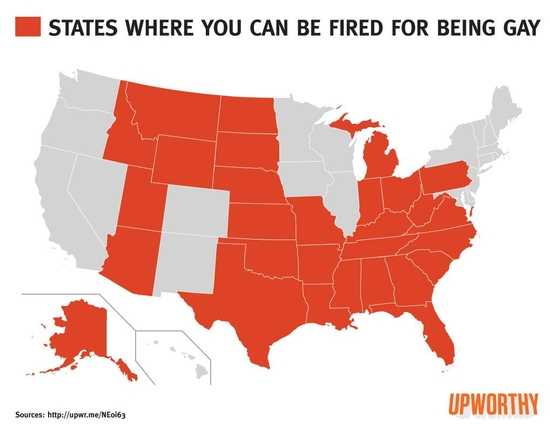
In a poll done by Huffington Post only 13% of people surveyed thought it was legal to fire someone for being gay. Unfortunately, that’s not the case. In the United states LGBT people can still be legally fired from their jobs in 29 states. In 33 states, you can be fired because of your gender identity. Activists have been struggling to pass The Employee Nondiscrimination Act (aka ENDA) for the last 20 years. The bill would guarantee federal protection against discrimination in all 50 states. The main reason this bill hasn’t been passed is because most US citizens don’t know this is even an issue. You can help, by learning more about the bill and spreading word about these injustices.
(2) Homelessness.
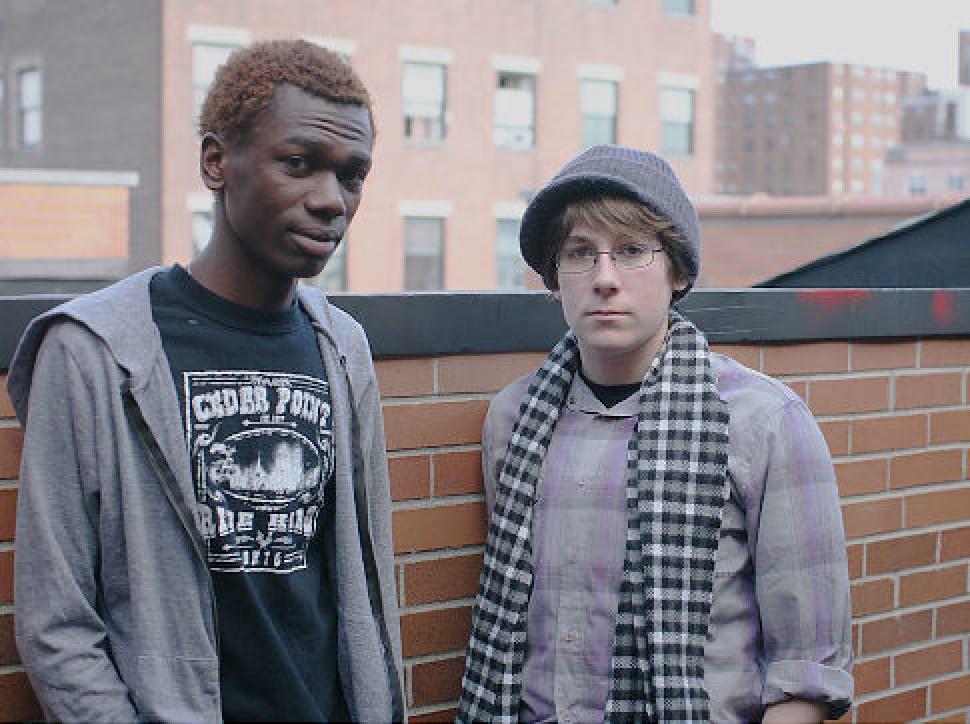
Nearly 40% of homeless youth in the US are LGBT kids. When you consider that most estimates of LGBT people are somewhere between 4-10% of the population, that figure is staggering. Many LGBT youth are homeless because they’ve chosen to leave or have been forced out of their homes. Once on the streets, they are forced into a life of violence, survival sex and in many cases abuse of power. Over the past decade, the acceptance of same-sex marriage and the growing number of openly LGBT celebrities has resulted in young people coming out at much earlier ages. Despite the fact that many young people are finding support from their friends, they are not finding the same welcoming attitudes amongst their families.
(3) Inclusive Curriculum in Schools.
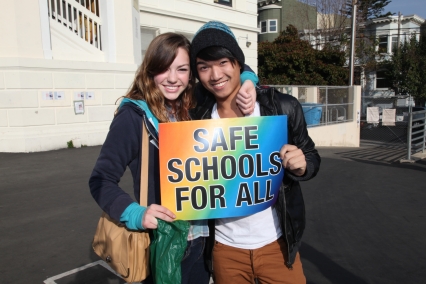
Most people are probably thinking, “what the heck does that even mean?” Inclusive curriculum is when teachers weave stories of LGBT people through out the course material over the school year. Having LGBT people included in classroom education helps create an environment of acceptance for all kids in the school. According to GLSEN’s research, it helps LGBT kids feel safer and more likely to talk to their teachers about LGBT issues. Educating kids while they’re young about equality and acceptance will help them become adults that are more accepting.
(4) Comprehensive Sexual Education.
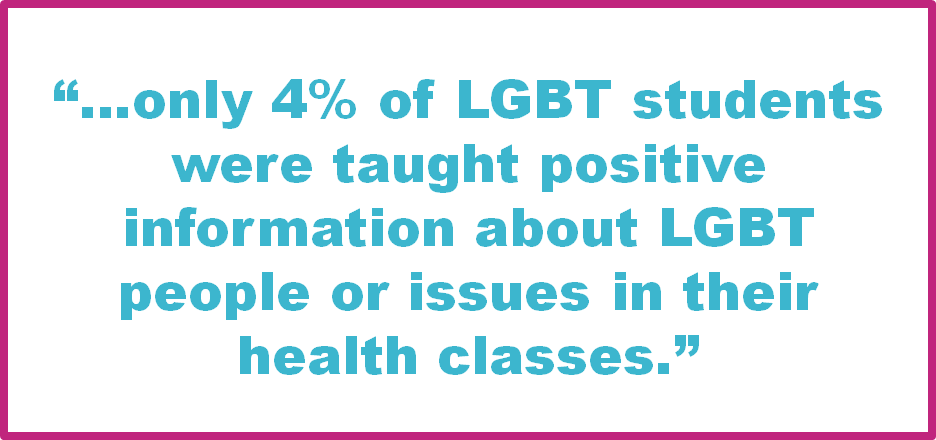
The US government has given $1.5 Billion, yes you read that right, $1.5 BILLION dollars, in support of abstinence only sexual education. This is the whole “wait until marriage” argument. Abstinence only programs have been shown time and again to be ineffective at reducing sexual activity, STIs or preventing pregnancy, but they are still being used in public schools. Only 7 of America’s 50 states legally mandate that information about contraception taught in schools is medically accurate. LGBT youth who are already at higher risk than straight students are often denied any kind of sexual education that includes same-sex sexual activity, in fact the curriculum of many states actually promote bias of LGBT people. Lack of education has resulted in some frankly depressing outcomes for LGBT kids including higher rates of STIs and HIV. The rate of pregnancy for young women who identify as lesbians or bisexuals is thought to be 2 to 7 times greater than women who identify as straight according to Not Yet Equal. Many young lesbians feel pressured to have sex with men in order to conform to societal expectations. Dr. Elizabeth Saewyc believes that engaging in sexual activity with male peers may also be a way that some lesbians hide their sexuality and reduce homophobic bullying.
(5) Immigration.
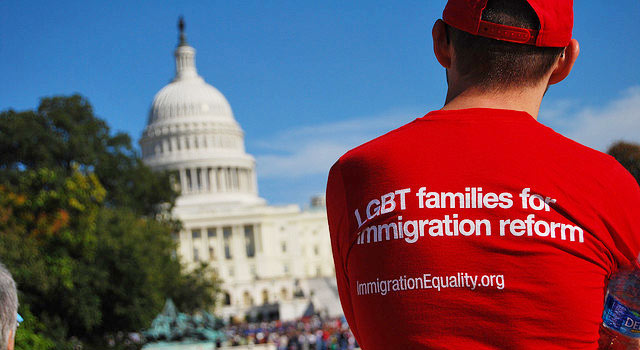
Immigration is a complex issue for LGBT people because it intersects with many different social issues and political policies. According to a study released by the Williams Institute, 30% of LGBT immigrants are undocumented. LGBT immigrants are actively contributing to their communities but live under the constant threat that they will be taken away from their homes and loved ones. One of the numerous reforms supported by the Center for American Progress is to end the one-year filing deadline for asylum seekers. Many of the LGBT seeking asylum are doing so to escape the oppressive laws of their home countries. In 88 countries around the world, there are laws against homosexuality. In 72 of those countries, being LGBT is punished by imprisonment and in 7 countries by death. Having arbitrary deadlines when filing for asylum creates more loopholes that further complicate the lives of an extremely underserved people.
(6) Hate crimes and Violence.
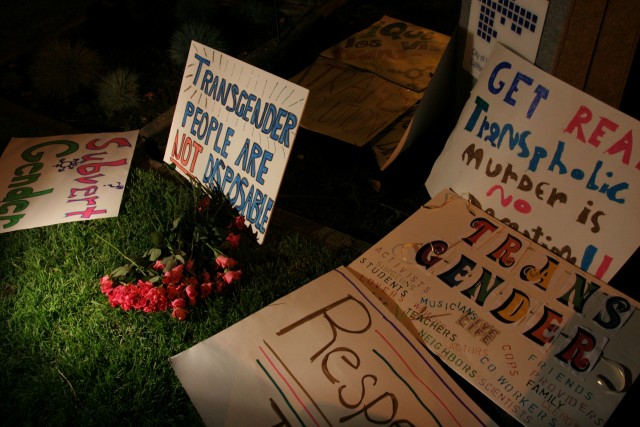
29 states still lack full hate crime protection for LGBT people. In Pennsylvania, a gay male couple was beaten by a group of twenty-somethings while walking to dinner. Bryan Higgins was murdered in San Francisco. In Texas, Burke Burnett was stabbed repeatedly with a piece of broken glass and then thrown onto a bonfire. In New York City, Islan Nettles was beaten to death. In Baltimore, Mia Henderson, Kandy Hall and Kelly Young were all murdered over the course of three months in what is thought to be a series of connected murders. When people are being attacked, beaten and murdered because they are LGBT, it makes marriage equality seem like a less worthy cause to be spending our limited resources.
(7) Trans* visibility.
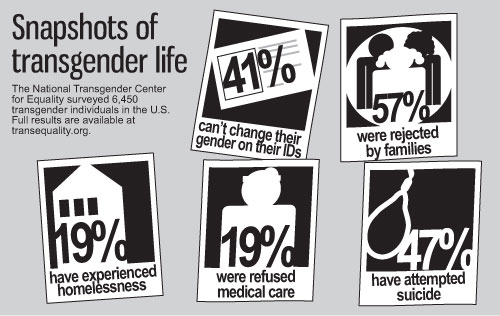
1 in every 12-transgender person in America is murdered. Let that sink in for a minute. One in every twelve. The Human Rights Campaign also reported in their 2009 study that 50% of Trans* people have been raped or assaulted by a romantic partner. The employment discrimination against Trans* people is so strong that according to The Task Force Trans* Americans are 4 times more likely to be earning less than $10,000 per year. Frankly, these statistics are horrifying. For ways that you can help, contact the National Center for Transgender Equality.
(8) Racial Justice.
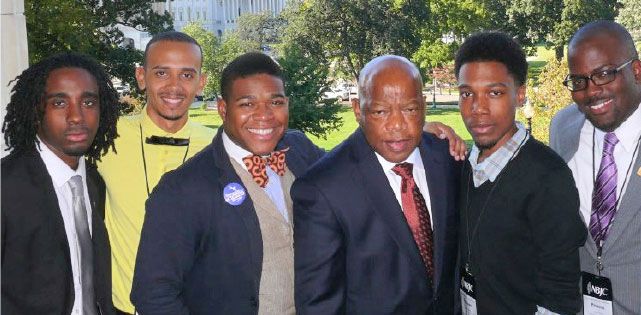
Oppression is the root of all social issues. When someone identifies with more than one oppressed group, the impact of the oppression can become even starker. LGBT people of color face all of the stigma and oppression of both marginalized groups of people. According to the Anti-Violence Project 70% of the anti-LGBT murder victims in 2010 were LGBT people of color. LGBT people of color are more likely to be discriminated against, the victims of violence and less likely to live above the poverty line. Many of the policies at the forefront of the LGBT movement do not take into account the diversity of the LGBT community. The largest LGBT organizations in America are economically homogenous and extremely white-washed. Many LGBT people of color are discontent with the lack of diversity in gay nonprofits as well as the lack of programming targeted towards LGBT youth of color.
(9) Anti-bullying legislation.
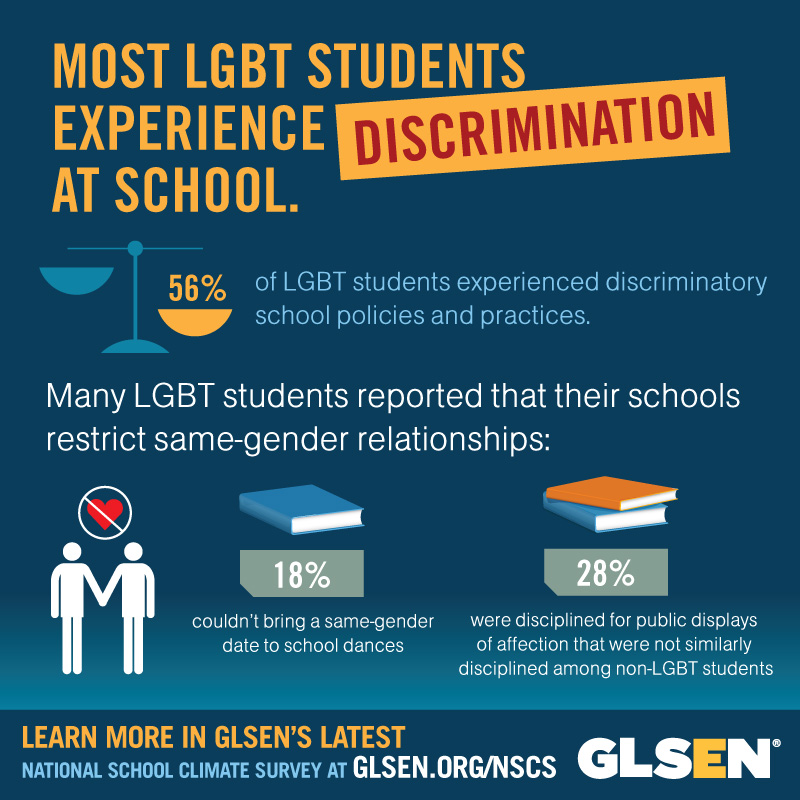
American schools are unsafe for LGBT students. According to GLSEN’s National School Climate Survey 85% of LGBT students were verbally harassed in school. Harassment and bullying leads to lower GPAs, lower rates of attendance and makes students less likely to want to go on to college. Lower educational aspirations for LGBT students means that many LGBT students will not be able to make a living wage when they are old enough to join the work force. The good news is that having comprehensive anti-bullying policies, LGBT inclusive curricula, supportive educators and a GSA all lead to a more LGBT friendly and inclusive school. You can help by spreading the word and sharing GLSEN’s stats on social media.
(10) Parenting.
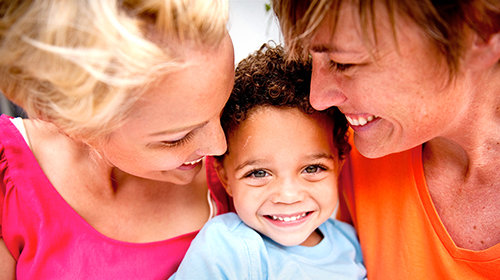
Every mainstream health and child welfare organization has released a statement in support of LGBT parenting. With three decades of research, social scientists believe that children are just as well off in a house with same sex parents as they are with opposite sex parents. One study even claims that LGBT parents may raise happier and healthier children. Despite the abundance of evidence, several states still have bans on LGB adoption and fostering and even more states have bans against joint and second parent adoptions. LGBT parents are entitled to the same rights and privileges of other parents and should not be denied the opportunity to give a child a home. What matters for children is having nurturing and committed parents, not the gender of those parents.
 Meg Ten Eyck is a former LGBT rights activist, currently living in South Korea and traveling the world with her partner Lindsay. They write about their experiences as a queer couple on their blog Dopes on the Road and post their travel photos on Instagram @dopesontheroad.
Meg Ten Eyck is a former LGBT rights activist, currently living in South Korea and traveling the world with her partner Lindsay. They write about their experiences as a queer couple on their blog Dopes on the Road and post their travel photos on Instagram @dopesontheroad.
